A blockchain domain name system (DNS) is an innovative approach to managing and resolving domain names using blockchain technology. Unlike traditional DNS, which relies on centralized authorities, blockchain DNS distributes domain ownership and records across a decentralized network, enhancing security, transparency, and censorship resistance. This guide explores the transformative potential of blockchain DNS in modern internet technology, especially as demands for privacy, security, and user empowerment grow.
Why Blockchain DNS Matters in Modern Internet Technology
Traditional DNS systems are vulnerable to cyberattacks, censorship, and single points of failure. Blockchain DNS addresses these issues by leveraging decentralized ledgers, making domain records immutable and accessible without centralized oversight. This is especially relevant as digital identity, secure IoT device management, and decentralized content hosting gain traction.
Current Challenges with Traditional DNS
- Centralized control leads to censorship and single points of failure.
- Susceptibility to DNS spoofing, cache poisoning, and DDoS attacks.
- Scalability and reliability issues as the internet expands.
- Limited user control over domain ownership and management.
Background on Blockchain DNS Technology: Fundamentals and Evolution
Origins and Development of Blockchain DNS
DNS began as a centralized system in the 1980s, evolving to handle the internet’s rapid growth. Centralized authorities like ICANN manage traditional domains, introducing vulnerabilities. Blockchain technology, introduced in the late 2000s, inspired decentralized alternatives, culminating in blockchain-based DNS that addresses issues of control, censorship, and security.
Key Technologies Behind Blockchain DNS
- Blockchain networks (Ethereum, Polygon, custom chains)
- Smart contracts for automated registration and management
- Decentralized Identifiers (DIDs) for device and user identity
- Integration with content-addressable storage (e.g., IPFS)
How Blockchain Enhances Traditional DNS Systems
Blockchain DNS improves upon traditional systems by distributing domain records across nodes, supporting immutable ownership, and eliminating renewal fees. Smart contracts automate transfers and updates, while cryptographic security ensures data integrity and transparency.

Core Concepts of Blockchain Domain Name System Explained
Decentralization in DNS
Decentralized DNS distributes domain record management across a blockchain network, reducing censorship and enhancing resilience. Each domain is represented as a unique token or record on-chain, providing users with direct control.
Key term: Decentralized Identifier (DID) – a self-sovereign, blockchain-based identity standard used for IoT, digital identity, and secure device management.
Role of Smart Contracts in Blockchain DNS
Smart contracts facilitate automated, tamper-proof domain registration, transfer, and resolution. They minimize reliance on intermediaries and enable programmable domain features, such as linking to wallets or IPFS content.
Integration with Blockchain Networks
- Domains as NFTs or unique records on blockchain (e.g., ENS .eth, HashtagSpace hashtags)
- Cross-chain compatibility and interoperability
- Programmable domain ownership and access management
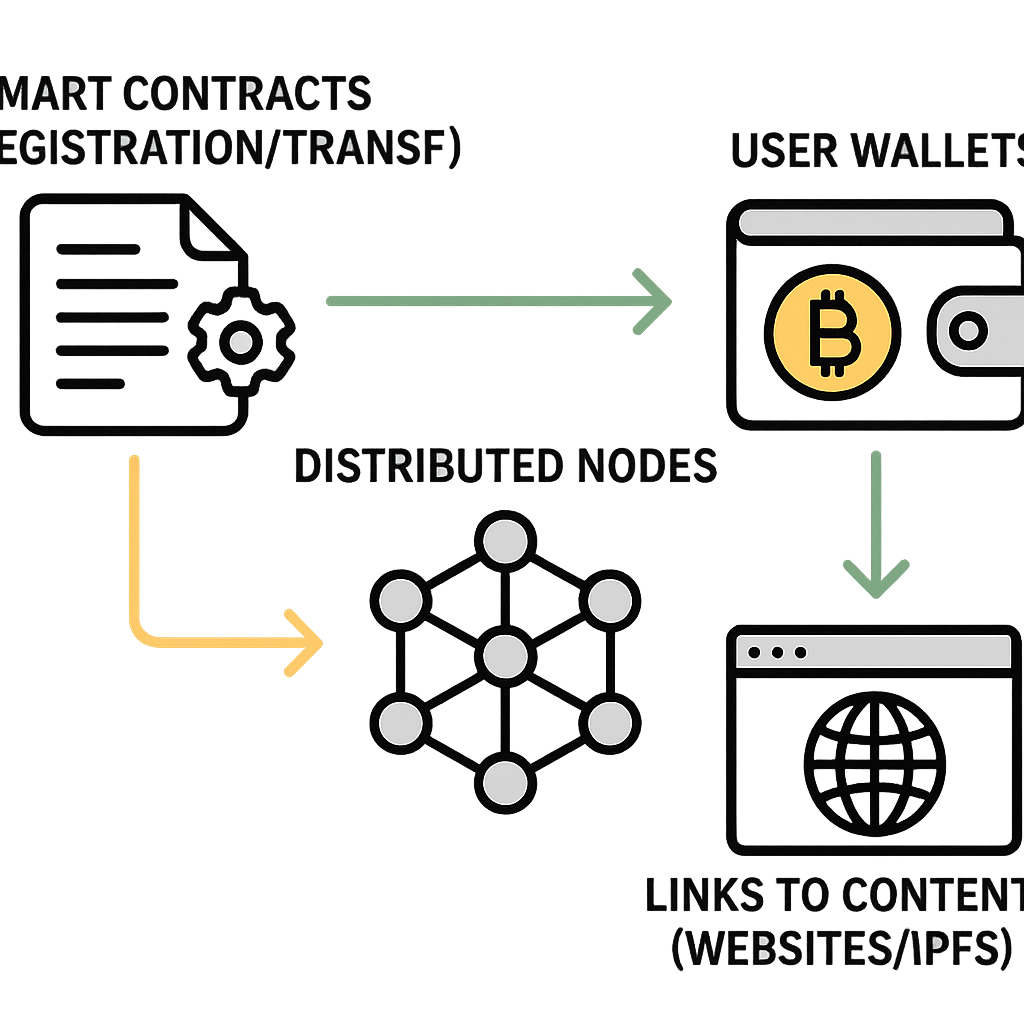
Step-by-Step Guide to Implementing Blockchain DNS
Prerequisites for Blockchain DNS Setup
- Basic understanding of blockchain technology and wallets
- Familiarity with smart contracts (Solidity for Ethereum-based platforms)
- Access to a supported blockchain DNS platform (e.g., Hashtag.it.com, ENS, Unstoppable Domains)
- Optional: IPFS node for decentralized website hosting
Stepwise Implementation Process
- Select a blockchain DNS provider (compare ENS, Unstoppable Domains, Hashtag.it.com)
- Register your domain (mint as NFT or unique token)
- Deploy or interact with smart contracts for domain management
- Configure DNS records to point to web resources, wallet addresses, or IPFS content hashes
- Test domain resolution on supported browsers or gateway services
For Hashtag.it.com, registration and management can be performed via their DApp, with options for decentralized email, streaming, and marketing tools.
Integrating Blockchain DNS with IPFS Website Hosting
To host a decentralized website, upload site files to IPFS and obtain the content hash (CID). Update your blockchain DNS records to map the domain to this CID, enabling users to access the site via blockchain DNS-enabled browsers or public gateways.
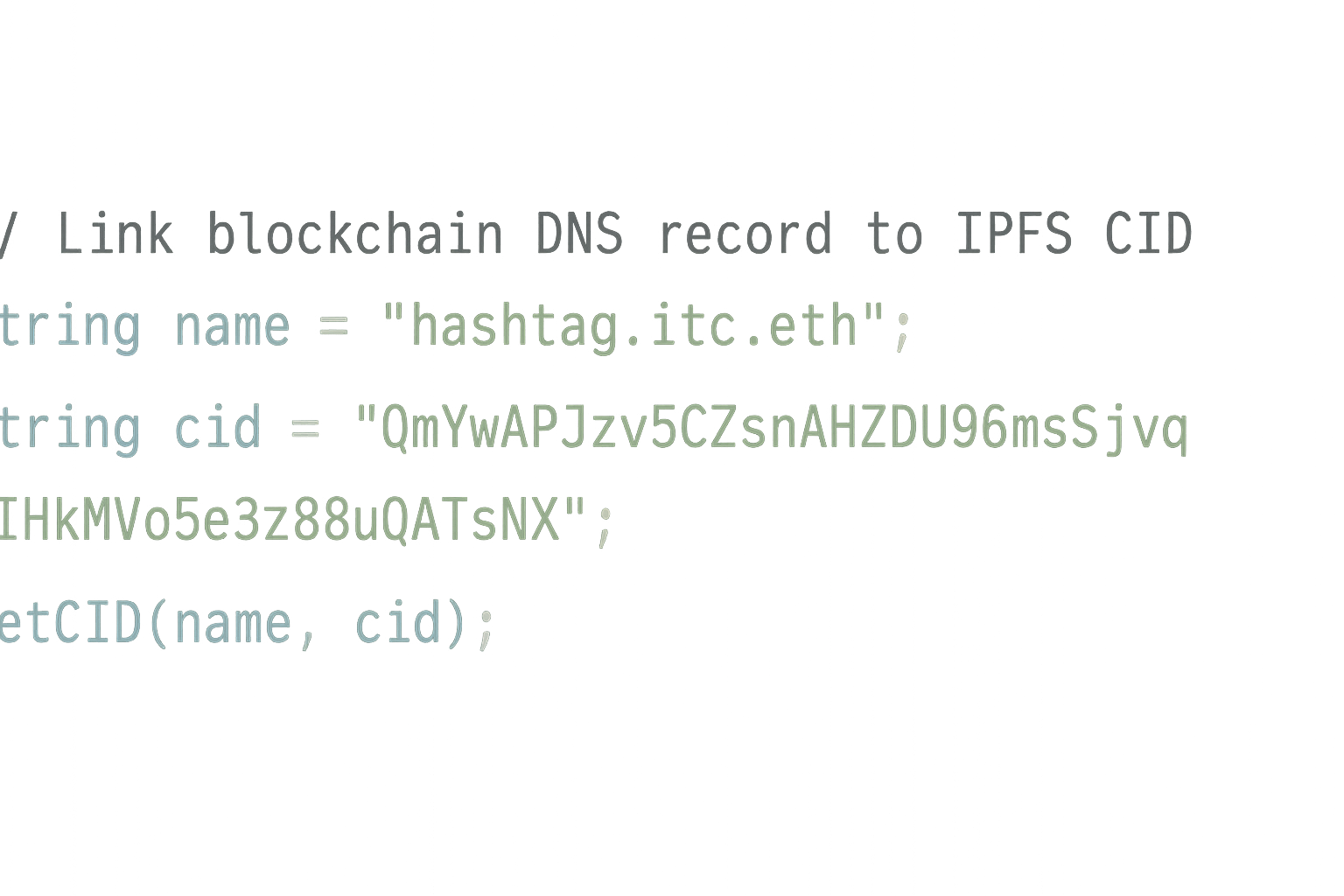
// Example: Updating ENS domain to point to an IPFS CID
resolver.setContenthash(namehash('mydomain.eth'), 'ipfs://'); {
"domain": "#mybrand",
"ipfs_cid": "Qm...abc",
"record_type": "IPFS"
}Common Challenges and Solutions in Blockchain DNS Adoption
Security Concerns and Mitigations
- Domain hijacking via compromised private keys
- Smart contract vulnerabilities and exploits
- Phishing via look-alike domains
Always perform smart contract audits, use multi-signature wallets for critical actions, and educate users on key management.
Scalability Challenges
Blockchain networks may face transaction bottlenecks and higher costs during peak usage. Layer-2 solutions and optimized smart contract logic can help improve scalability.
User Adoption and Usability Issues
- Requirement for blockchain wallet setup
- Complexity of managing DNS records on-chain
- Interoperability with traditional browsers and DNS infrastructure
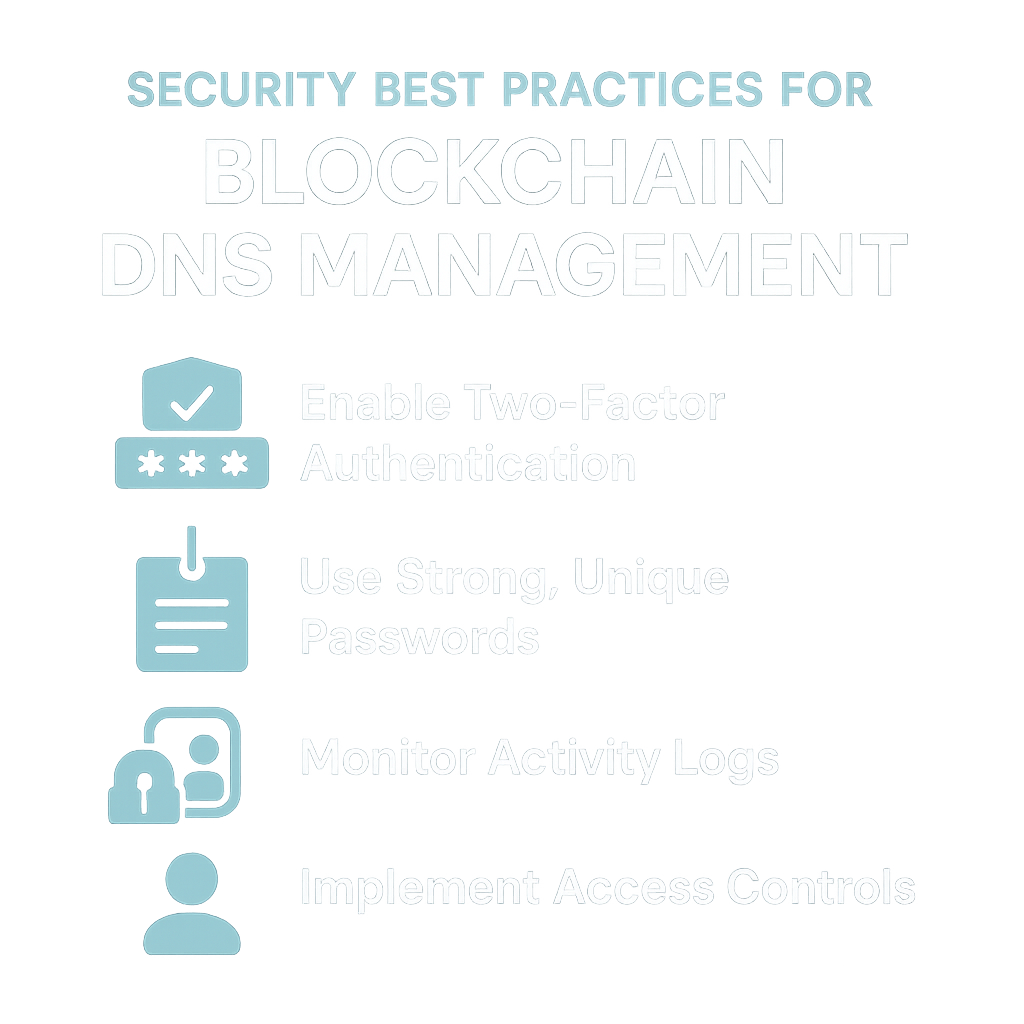
Best Practices and Security Considerations for Blockchain DNS
Security Best Practices for Blockchain DNS
- Regularly audit smart contracts and DNS records
- Implement strong private key management and multi-factor authentication
- Monitor for suspicious activity and unauthorized changes
Managing Access and Permissions Safely
- Use multi-signature wallets for high-value domains
- Restrict permissions for domain management actions
- Leverage DAOs for decentralized governance and dispute resolution
Regular Maintenance and Updates
- Test DNS resolution regularly
- Update smart contracts and records as security standards evolve
- Stay informed about emerging threats and mitigation strategies
Case Studies and Real-World Examples of Blockchain DNS in Use
Blockchain DNS for IoT Device Identity Management
Decentralized Identifiers (DIDs) and blockchain DNS are used to assign secure, tamper-proof identities to IoT devices. Projects like China RealDID enable real-name registration, encrypted access, and device authentication, enhancing trust and regulatory compliance in large-scale IoT deployments.
Integration with IPFS for Website Hosting
Platforms such as Unstoppable Domains and Hashtag.it.com enable users to link their blockchain domains to IPFS content hashes, providing decentralized, censorship-resistant websites. This approach improves permanence and accessibility for digital content.
Other Notable Blockchain DNS Applications
- Digital identity management for individuals and organizations
- Decentralized email and communication services (Hashtag.it.com)
- Web3 marketing and search (keyword staking on Hashtag.it.com)
Resource Links and Essential Tools for Blockchain DNS
Top Blockchain DNS Tools and Platforms
- Hashtag.it.com – Decentralized domain registry, email, streaming, and Web3 marketing
- Ethereum Name Service (ENS) – Leading open-source blockchain DNS on Ethereum
- Unstoppable Domains – Multi-chain registry supporting IPFS, NFT domains, and crypto payments
- BitDNS – Bridging traditional DNS and blockchain DNS
Educational Resources and Tutorials
- ENS documentation: https://docs.ens.domains/
- Unstoppable Domains guides: https://unstoppabledomains.com/learn
- Hashtag.it.com White Paper: https://hashtag.it.com/wp-content/uploads/2024/08/hashtagspace-whitepaper.pdf
- IPFS How-To: https://docs.ipfs.tech/how-to/
- Blockchain DNS implementation on GitHub: https://github.com/search?q=blockchain+dns
Community and Support Networks
- ENS Community Forum: https://discuss.ens.domains/
- Unstoppable Domains Discord: https://discord.gg/unstoppabledomains
- Hashtag.it.com support: https://hashtag.it.com/contact/
FAQs: Common Questions About Blockchain Domain Name System
What is Blockchain DNS?
Blockchain DNS is a decentralized domain name system where domain records are stored on a blockchain, giving users direct ownership and control, and enhancing security and censorship resistance.
How Does Blockchain DNS Work?
Blockchain DNS uses smart contracts and distributed ledgers to register, update, and resolve domain names. Users interact with the system via wallets or DApps, and domain data is publicly verifiable on-chain.
Is Blockchain DNS Secure?
Blockchain DNS is generally more secure than traditional DNS, thanks to cryptographic protections and decentralization. However, users must safeguard their private keys and use audited smart contracts to prevent attacks.
- Can I use blockchain DNS for IoT device management? (Yes, via DIDs and secure on-chain records)
- How do I link my website to IPFS using blockchain DNS? (Add your IPFS CID to the domain record on a supported platform)
- Are there renewal fees? (Most blockchain DNS platforms offer permanent ownership without renewals)

Summary and Next Steps: Advancing with Blockchain DNS
Key Takeaways on Blockchain DNS
- Blockchain DNS decentralizes domain management, enhancing security and user control.
- Integration with IoT and IPFS enables new use cases for digital identity and decentralized content hosting.
- Platforms like Hashtag.it.com offer easy onboarding, additional Web3 services, and strong security features.
- Staying informed about best practices and emerging threats is crucial for successful adoption.
Recommended Actions for Implementation
- Evaluate blockchain DNS providers based on features, security, and integrations.
- Register a blockchain domain for your brand, project, or personal identity.
- Experiment with linking IPFS content and exploring decentralized email or streaming.
- Join community forums for troubleshooting and updates.
Further Learning and Resources
Explore platform documentation, developer guides, and case studies to deepen your understanding. Hashtag.it.com’s white paper and DApp are excellent starting points for hands-on experience.
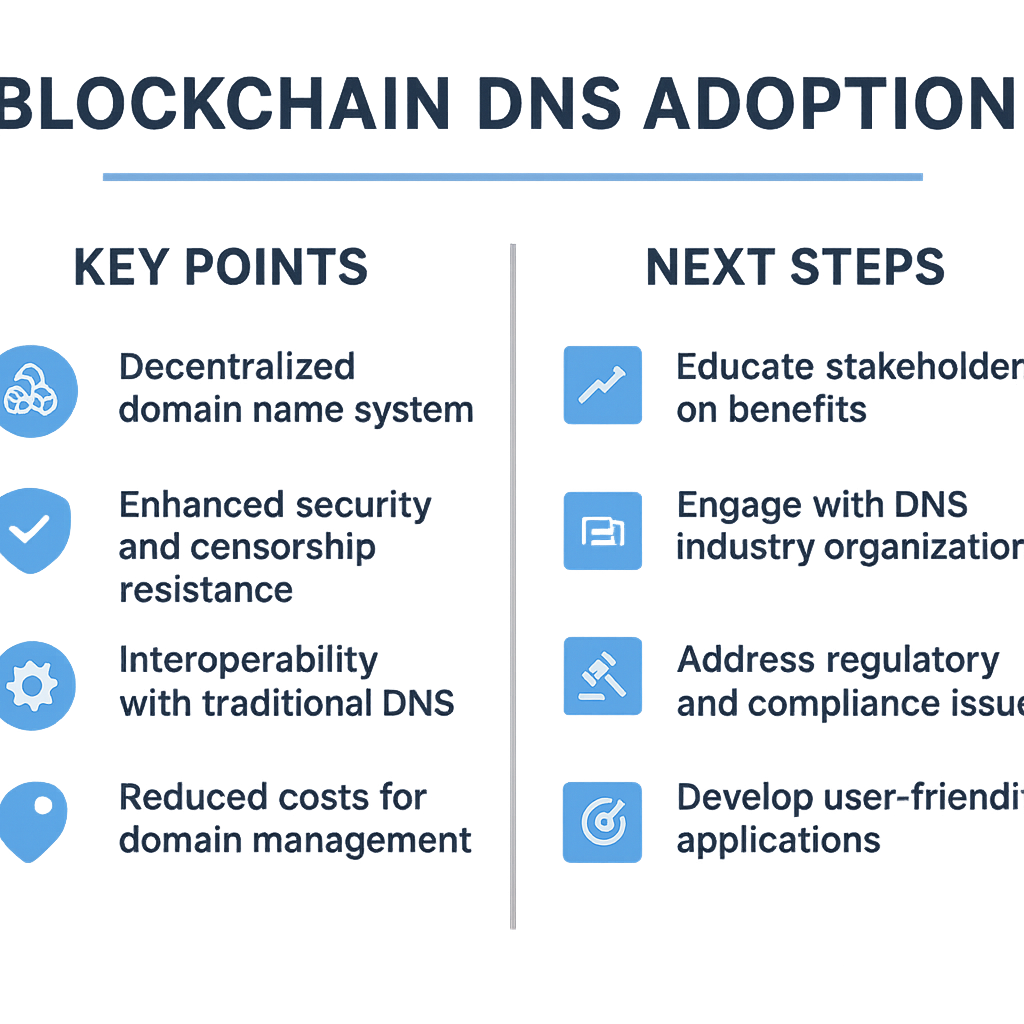
Conclusion: The Future of Blockchain Domain Name System
Blockchain domain name systems are paving the way for a more secure, censorship-resistant, and user-empowered internet. Platforms like Hashtag.it.com are at the forefront, enabling users to manage digital identities, host content on IPFS, and leverage decentralized marketing tools. By adopting best practices and staying engaged with the community, users can maximize the benefits of blockchain DNS in the evolving Web3 landscape.
References
- https://dn.org/dns-and-blockchain-innovation-in-decentralized-name-services/
- https://get.one/decentralized-vs-traditional-dns/
- https://hashtag.it.com/blockchain-domain-name-system-346524/
- https://dn.org/navigating-the-evolution-traditional-dns-vs-web-3-0-domain-systems/
- https://hashtag.it.com/blockchain-domain-registry-346535/
- https://bitdnsofficial.medium.com/bitdns-ens-and-unstoppable-domains-comparision-85aa814bfd41
- https://hashtag.it.com/blockchain-domains-346391/
- https://hashtag.it.com/blockchain-domain-name-system-346524bc/
- https://www.namecheap.com/blog/implementing-blockchain-to-secure-domain-names/
- https://hashtag.it.com/how-to-buy-a-blockchain-domain-35/
- https://docs.ens.domains/
- https://www.kryptokraken.com/what-is-blockchain-dns-and-how-does-it-work/
- https://hashtag.it.com/blockchain-dns-570113/
- https://www.dnib.com/articles/blockchain-DNS-responsible-integration
- https://dn.org/the-future-of-domain-security-in-decentralized-networks/
- https://en.wikipedia.org/wiki/China_RealDID
- https://hashtag.it.com/blockchain-domains-346391/
- https://dn.org/bridging-dns-and-distributed-web-technologies-for-a-decentralized-future/
- https://unstoppabledomains.com/learn
- https://docs.ipfs.tech/how-to/
- https://github.com/search?q=blockchain+dns
- https://hashtag.it.com/blockchain-domain-name-system-346524/#faq
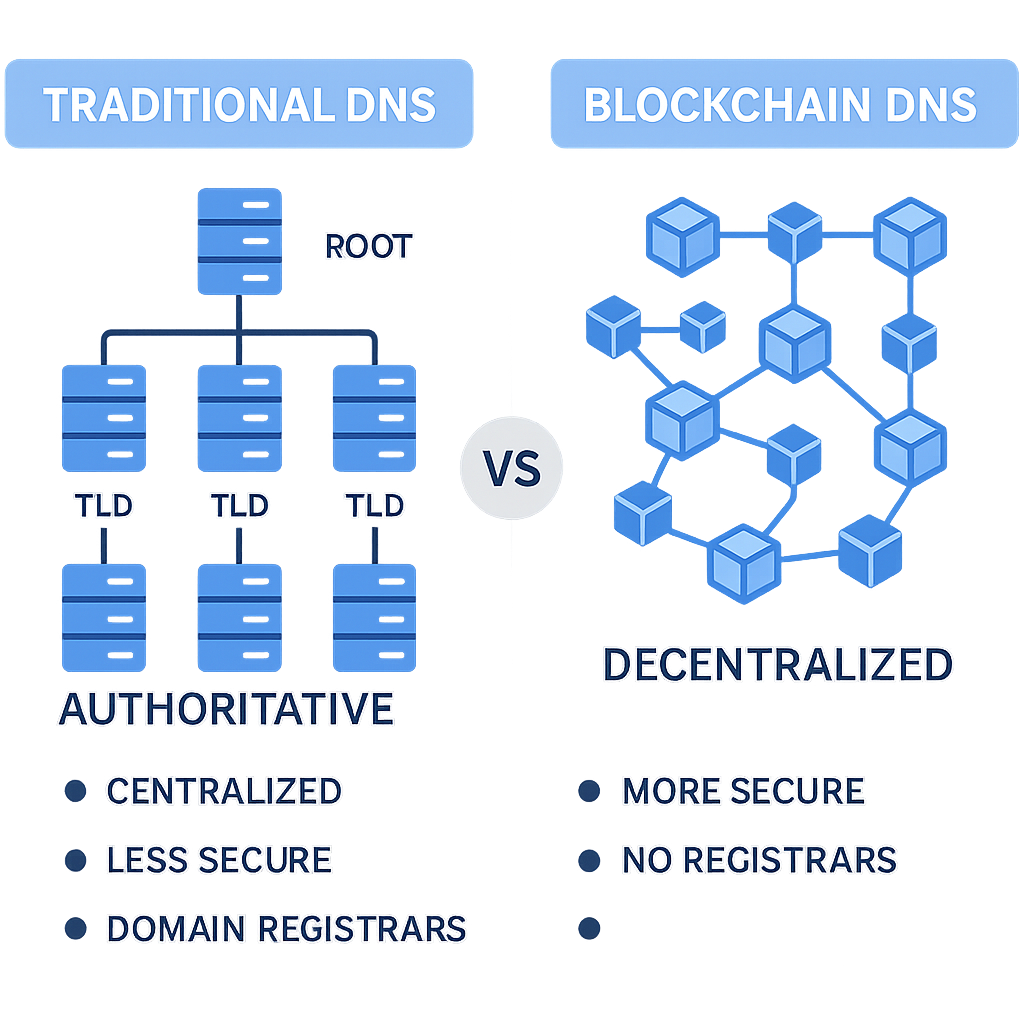
Leave a Reply